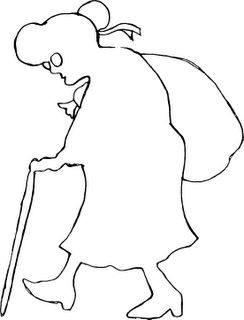Wednesday, May 04, 2005
Is the Pope Catholic?
Remember the wise-acre comeback for any question with an obvious answer? (“Is Michael Jordan the best basketball player ever?” “Is the Pope Catholic?”)
Not being Catholic, I’ve been safely ensconced in the peanut gallery, watching all the hoopla surrounding the papal selection process. So many possible angles from which to approach, so many levels on which to observe (if not participate). You might say I’m a Cafeteria Commentator. Observational Relativism rules!
And, of course, I tend to be a delayed-reaction commentator, and most of the initial surge of interest has done gone went in search of the next Peeping-Tom session. Or reality TV—I get confused.
So only now is it time for me to expound. Now it’s not just yesterday’s news, it’s last month’s news, and that’s as good as last millennium’s news. Most people are moving on except me, because I haven’t fleshed out how I feel about it all. Here goes, in the interest of my moving on to the next opportunity for opinionated procrastination. Or procrastinated opinionation.
The process of selecting a new pope more or less guaranteed the outcome. I don’t mean the choice of Benedict XVI specifically, but certainly of someone whose theology would make him somewhat interchangeable with Benedict (leaving aside the issue of leadership skills for now).
John Paul II made a large majority of the current Cardinals. Could anybody reasonably expect that he would make someone a Cardinal that he perceived as being out of line with the Catholic church’s (his) theology, in the interest of making sure all voices are heard? The idea of considering dissenting voices just in case you might be wrong (or for other plausible reasons) is rather rare.
Well, if you are a trustee of a very strong institution, charged with maintaining it and seeing to its continuance, and your position is based on conscience shaped by your many years in the institution, are you going to change course abruptly? I can imagine that a significant number of the Cardinals believe that “if it ain’t broke, don’t fix it.” I suspect they can easily describe the problems facing the church as being not of the church’s making. That original sin continues to dog the world, as ever. And changing one’s theological stance in an attempt to fix problems has never impacted the effect of original sin.
Then, to avoid the possibility of being confused (or swayed) by differing viewpoints, you go into conclave, where all contact with the outside world is cut off. That is sort of the game plan for brain-washing, isn’t it? Yes, I know that sometimes one must diminish the opportunity for distraction as much as possible, but then one invokes an incredibly vulnerable situation that can lead to really bad thought process. (I’m mindful of the think-tank that produced the Bay of Pigs incident. Sorry--I’d point you someplace if I could, but my sources for this are somewhat long-ago and not well-researched online.)
Did anybody realistically believe it would go another way? That there’d be a Saul-to-Paul-like conversion on the Damascus road, whereby the Roman Catholic church would choose someone who would take the church in the direction of considering ordination of women and gays, marriage for priests, etc.?
Guardians of the faith did what they were expected to do: guard the faith as they understand it. Well-trained, thoroughly indoctrinated. The cardinals did their job. They ensured that the Catholic church would continue as it has done.
Is the Pope Catholic? Yes. Yes, I believe he is.
Subscribe to:
Post Comments (Atom)

1 comment:
Ah, but given that Ratzinger had a Paul-to-Saul conversion in his youth (going from liberal to conservative)... was it too much to expect he might do the same again?
Oops... he only got where he is *by* becoming conservative.
Good ideas. I really liked your points. :-)
Post a Comment